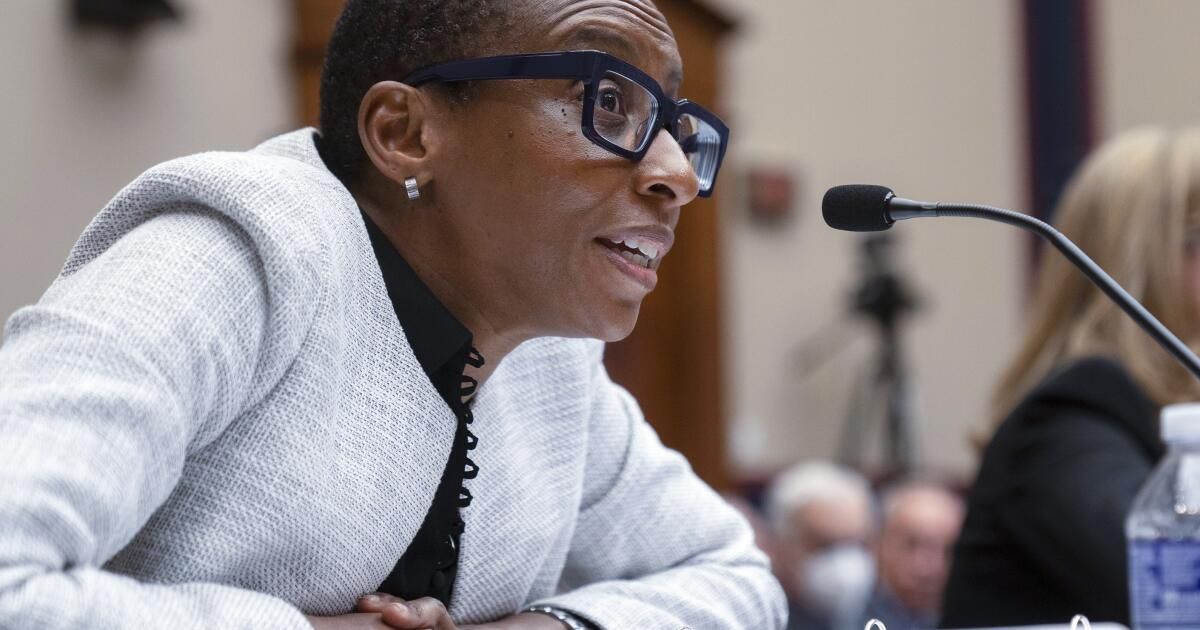When irresponsible agitators accuse Derek Penslar of anti-Semitism, you know something has gone off the rails. We must be clear: what they are attacking is not just an eminent scholar, but more broadly, the American university as a place of experience and critical thought.
Penslar, a Harvard history professor, is the embodiment of experience. He was fixed last week by that institution's interim president, Alan Garber, to co-chair a working group on anti-Semitism at the university. In response to the announcement, right-wing media outlets, including the New York Post and the National Review, reacted with outrage, suggesting that Penslar was unfit for the task because, as the National Review put it, “has been critical of Israel.”
In this case – and indeed, with that particular accusation – we can see how clearly disingenuous these right-wing critics are. They often claim that criticism of Israeli government policy is not necessarily anti-Semitic. But either they don't believe his claims or they use them strategically to advance their agenda of silencing those they disagree with.
In Penslar they simply got the wrong person. He is a deeply committed Jew and a noted scholar, widely known and respected for his judicious, kind, and unfailingly balanced nature. Throughout his career, he has earned a reputation as one of the world's leading historians of Zionism.
Penslar's major works, from his first book “Zionism and Technocracy” to his most recent book “Zionism: An Emotional State,” are characterized by conceptual rigor, careful selection of evidence, and clear writing. His reputation extends to Israel, where he is well known and widely admired by the academic establishment there. Indeed, he has been a major factor in the growth and expansion of Israel studies in North America and Europe.
Much of the energy behind the attack on Penslar came not from something he wrote but from something he signed: the letter “The elephant in the room”, which attracted the support of almost 3,000 academics and intellectuals. Drafted in August, long before October 7, the letter called on Israel to take significant steps toward democracy by ending its occupation of Palestinian territory.
The letter referred to Israeli control over the West Bank as “an apartheid regime.” While this is undeniably harsh language, it captures the harsh and often brutal realities faced by Palestinians in the West Bank, who are denied access to the same rights, services and facilities as Israeli Jews living there.
It is a language that the former Mossad director Tamir Pardo used to describe Israel's absolute dominance. And it is language that a good number of human rights organizations, including the main Israeli NGOs, they have used themselves. These individuals and organizations refer to apartheid not because they are motivated by anti-Semitism, but because it is the word they believe best describes the two-tier justice system that Palestinians must live with in the West Bank.
In the fight Now former Harvard president Lawrence Summers and Anti-Defamation League CEO Jonathan Greenblatt, who posted messages on social media criticizing Penslar, have resigned. Greenblatt accuses Penslar of being someone who “libels to the Jewish state.” On Tuesday, Rep. Elise Stefanik (RN.Y.) went beyond the pale by criticizing him for “his despicable anti-Semitic opinions and statements.”
These critics don't seem to care that they are being used by right-wing actors like Christopher Rufo and the Claremont Institute with the intention of attacking the “wokeness” of the American university and establishing a new type of institution marked by conservatism, lack of diversity and, frankly, mediocrity.
The strategy of these actors is to identify terms like critical race theory, social justice, and DEI (diversity, equity, and inclusion), strip them of any nuance or virtue, and then use them to caricature good colleges and universities as little more than “camps of reeducation” in the style of the Chinese Cultural Revolution.
For companies like Rufo and the Claremont Institute, the goal is to reverse decades of multiculturalism, affirmative action, and diversity efforts that have deeply enriched American higher education. They prefer institutions like Hillsdale College or the renovated New College that proudly eschew all forms of diversity in favor of a conservative, anti-woke ideological agenda.
Colleges and universities are not perfect institutions; They face their own challenges in navigating the boundary between free speech and respectful discourse. But those of us who care about the integrity and excellence of the higher education system in America must wake up to the reality of the growing power of this right-wing campaign of destruction. The attacks on Derek Penslar who consider him insufficiently attentive to anti-Semitism How far is this movement willing to go?. His highly partisan agenda has already knocked down some important targets. Let's not let it control the future of the American university.
David N. Myers holds the Kahn Chair in Jewish History at UCLA and directs the Luskin Center for History and Politics and the UCLA Initiative to Study Hate.












